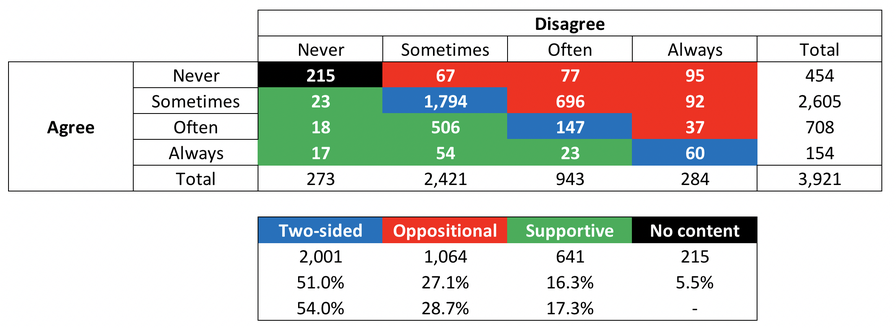How Prevalent are Filter Bubbles and Echo Chambers on Social Media? Not as Much as Conventional Wisdom Has It – Cristian Vaccari

my notes ( ? )
A wide-ranging overview and linkfest to studies showing that the prevalence and impact of political echo chambers are at least exaggerated, and a preview of the author's upcoming book on the subject, based on surveys held in France, Germany and the UK, where "the percentages of users who claim to often agree with the political content they see on social media are substantially lower than the percentages of users who claim to often disagree with those contents... more balanced results in Germany ... and more lopsided patterns in the UK ... and, especially, France".
They also asked about face2face interactions, where people are less more likely to encounter disagreeable views than in social media". So is real life more prone to filter bubbles? Again, large country differences: "The difference between agreement and disagreement in face-to-face conversations is of about 10% in France and the UK, and a whopping 36.8% in Germany"
To TV and newspapers, "the most important vehicles for political pluralism ... twice as many respondents claim they often disagree with the political views expressed in TV and newspapers than those who claim they often agree ... mass media are the main source of exposure to counter-attitudinal political information"
Then an analysis of the social media data to break down the respondents into:
- "Supportive”: agree more often than they disagree with the content they see (16% of all respondents - a small minority of social media users are in ideological echo chambers)
- “Oppositional”: disagree more often than they agree (27%)
- “Two-sided”: about the same (just over half have "a rather balanced combination of views they agree and disagree with)
"French respondents more likely to see oppositional content (29.5%) than British (26.1%) and German ones (25.8%), and, conversely, German respondents more likely to see supportive content (20%) than British (16.1%) and French ones (12.8%)"
Read the Full Post
The above notes were curated from the full post cristianvaccari.com/2018/02/13/how-prevalent-are-filter-bubbles-and-echo-chambers-on-social-media-not-as-much-as-president-obama-thinks/.Related reading
More Stuff I Like